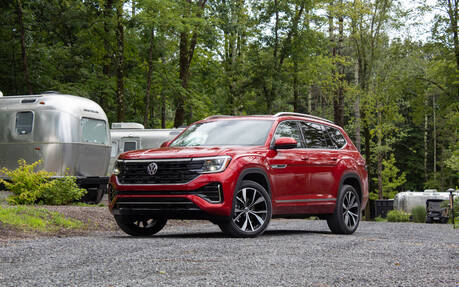2024 Volkswagen Atlas and Atlas Cross Sport: More Refined Even With No V6
Volkswagen’s largest SUV, the Atlas, made its debut six years ago as a 2018 model. It offered a spacious and practical cabin with seating for six or seven. A coupe-style, two-row variant called Atlas Cross Sport was added for 2020. Both models are now getting a significant update including cosmetic revisions, new technology and a big powertrain change.
Let’s start with styling, which is fresher and sharper. On all but base trims, the daytime running lights wrap around the headlights and continue into an illuminated lightbar that sits atop of an illuminated VW logo. In the rear, the taillights are now connected and the spoiler is larger.
- Also: Volkswagen Wants a Plug-in Hybrid in North America
- Also: Volkswagen Atlas Peak Edition Debuts as Yet Another Mild Off-Roader
Inside, more premium materials are adopted throughout, and fit and finish is improved. The air vents at the corners of the dashboard now have split openings so you can direct air to two different spots at the same time.
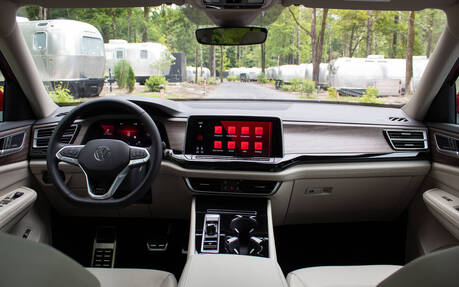
In front of the driver is a fully configurable 10.25-inch digital instrument panel that displays clear graphics. Smartly arranged buttons on the steering wheel make it easy to navigate through the menus. On the right is a 12-inch centre touchscreen powered by the latest generation of Volkswagen’s infotainment system, which boasts quicker response times for more user-friendly operation.
Below the screen are touch-sensitive controls for radio volume and HVAC. We get the idea, but these are simply not as ergonomic as physical buttons and knobs. The 30-colour ambient lighting system sure jazzes up the cabin.
No More V6
The muscular and unique-sounding 3.6-litre V6, which delivered 276 horsepower and 266 lb-ft. of torque, is no longer part of the lineup. For 2024, the Atlas and Atlas Cross Sport rely solely on a turbocharged 2.0-litre four-cylinder engine codenamed EA888 that now serves up 269 horsepower and 273 lb-ft.
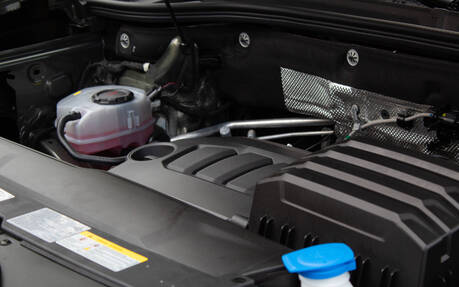
The numbers are pretty similar, so it’s easy to see why Volkswagen decided to axe the bigger mill. What’s more, fuel consumption is lower as evidenced by Natural Resources Canada’s combined rating of 10.8 L/100 km (or 11.5 L/100 km for the rugged new Peak Edition). Maximum towing capacity stays unchanged at 5,000 lbs.
Acceleration is a bit livelier thanks to peak torque being accessible from 1,600-4,500 rpm instead of 3,600 rpm with the V6. Volkswagen claims 0-60 mph sprints (0-97 km/h) are eight tenths of a second quicker

The eight-speed automatic transmission has been recalibrated and feels less jerky than before. Shifts are smooth even when using the paddle shifters on the steering wheel. Once again, all Atlas and Atlas Cross Sport models come standard with 4Motion all-wheel drive.
Ride quality is commendable, although the suspension feels a tad stiffer than in the past. Volkswagen has not detailed the changes that were made on that front for 2024. Occupants enjoy proper levels of comfort no matter where they sit. The third row isn’t ideal for long trips, but even tall adults will find enough legroom and shoulder room back there.
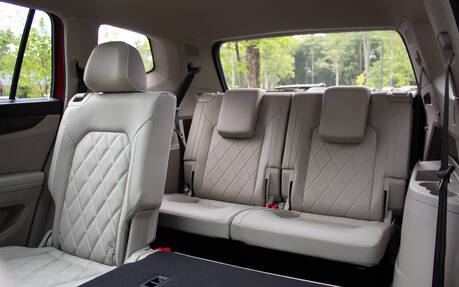
What about driver assistance technologies? The Atlas and Atlas Cross Sport offer semi-autonomous driving capability, with adaptive cruise control executing progressive acceleration and braking. However, lane keeping assist could definitely use some fine-tuning as the vehicles tend to go from one side of the lane to the other instead of gently getting back to the middle. The system still does what it’s supposed to, just not in a smooth, seamless way.
Mild Off-Roading
The extensive Volkswagen Atlas lineup adds a new model for 2024. Inspired by the Basecamp Concept from 2019, the adventurous-looking Atlas Peak Edition sports various black accents, plastic cladding around the wheel arches and along the lower body, a unique front grille with two chrome strips, as well as redesigned bumpers.
Eighteen-inch black alloy wheels fitted with all-terrain tires bolster the SUV’s versatility, while Avocado Green and Pure Grey are exclusive body colours options. Inside, light grey accents and orange stitching contrast with the Titan Black leatherette seats, while the dashboard and door inserts have a black metallic check pattern.
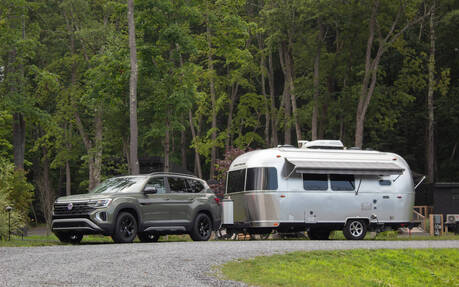
At $53,995, the Peak Edition slots just above the base Comfortline model ($49,995), which features 18-inch wheels, adaptive cruise control and heated/cooled front seats. The more upscale Highline ($56,995) stands out with 20-inch wheels, a panoramic roof, Harman Kardon audio and leather seats. Finally, there’s the luxurious Execline R-Line ($59,995), which adds 21-inch wheels, 360-degree surround view, head-up display and more.
Don’t Forget the Cross Sport
The Atlas Cross Sport is styled just like the larger Atlas, except for the truncated rear section. Visibility is compromised as a result since the rear window is smaller and the C-pillars are more massive. Additionally, there’s only room for five inside. Ride and handling characteristics are basically identical.
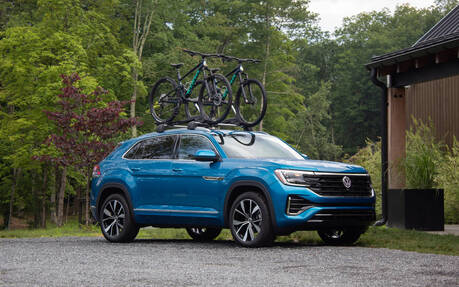
Model selection includes Comfortline ($48,895), Highline ($55,895) and Execline R-Line ($58,895). No Peak Edition here, at least not for the moment, Volkswagen says. That means settling for the two-row variant will save you $1,100 no matter which model you select.
At the end of the day, the 2024 Atlas and Atlas Cross Sport are more refined than their predecessors while still offering great versatility and a spirited four-cylinder engine. The cabin raises the bar for quality, and infotainment comes with more features than ever. The only thing that’s missing is a hybrid powertrain to go head-to-head with segment leaders such as the Toyota Highlander.
| Test drive report | |
| Test model | 2024 Volkswagen Atlas |
|---|---|
| Trim level | N/A |
| Price range | $49,995 – $59,995 |
| Price as tested | N/A |
| Warranty (basic) | 4 years/80,000 km |
| Warranty (powertrain) | 5 years/100,000 km |
| Fuel economy (city/highway/observed) | 11,8 / 9,8 / 10,8 L/100km |
| Options | N/A |
| Competitive models | Chevrolet Traverse, Dodge Durango, Ford Explorer, GMC Acadia, Honda Passport, Honda Pilot, Hyundai Palisade, Jeep Grand Cherokee, Kia Telluride, Mazda CX-9, Nissan Pathfinder, Subaru Ascent, Toyota Grand Highlander, Toyota Highlander |
| Strong points |
|
| Weak points |
|
| Editor's rating | |
| Fuel economy | Natural Resources Canada rates the 2024 Atlas at a combined 10.8 L/100 km. |
| Comfort | The seats are comfortable even in the second and third rows. |
| Performance | The turbo-four is a nice match for the Atlas, delivering lively acceleration thanks to generous low-end torque. |
| Infotainment | The updated system is much quicker and more pleasant to use than in the past. |
| Driving | The autobox is less jerky and the suspension feels stiffer. There’s plenty of comfort and convenience inside. |
| Overall | The 2024 Atlas and Atlas Cross Sport have evolved beautifully and are more refined than their predecessors. |
